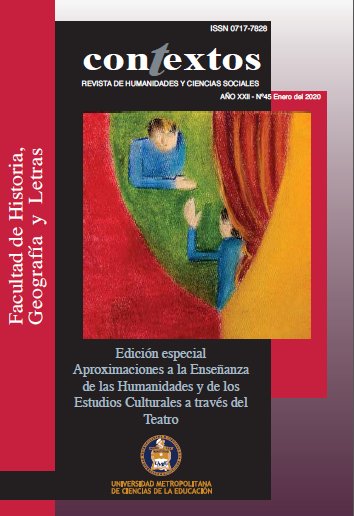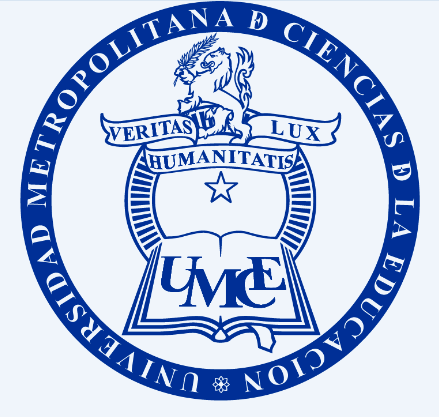Main Article Content
Jun 21, 2019
Abstract
This article provides guidance for the successful teaching of The Demon’s Nun (2003), by Petrona de la Cruz and Isabel Juárez Espinosa, founders of the association Empowerment of Mayan Women or FOMMA, to undergraduate students in upper-level Spanish courses. It focuses on the practice of theater as social change and offers a textual analysis. Along these lines, this essay includes the most recent bibliography on FOMMA, a detailed analysis of the drama techniques used by these Mayan playwrights, and it concludes with acting exercises.
Downloads
Policies for open access journals
Authors who publish here accept the following terms: Authors will keep their copyright and will guarantee the journal the right to the first publication of their work, which will be subject to the Licence of Creative Commons acknowledgement, which allows for the use of this material only if the authorship is credited and the original source is acknowledged (the journal’s URL), and if it is not used with commercial ends and with any derivations of the original work.
Authors may adopt other non-exclusive license agreements of distribution of the published version (e.g. to save it onto a digital institutional archive or publish it in a monographic volume) only if the initial publication of this journal is indicated.
It is permitted and recommended for authors to divulge their work on the Internet (e.g. institutional digital archives or webpage) before and during the submission process, which may lead to interesting exchanges and increase the citations of the publication. (See Open Access Effect).
References
André, María Claudia. 2015. “Fortaleza de la Mujer Maya: Entrevista a Petrona de la Cruz”. Alba de América35: 371-376.
Blanco-Cano, Rosana. 2009. “Geografías alternativas: Una mujer desesperada(1991) de Petrona de la Cruz y el grupo teatral FOMMA”. Chicana/Latina Studies8: 91-124.
De la Cruz, Petrona e Isabel Juárez Espinosa. (2003). La monja bruja[en línea] Disponible en http://hemisphericinstitute.org/hemi/fr/modules/itemlist/category/69-fomma[Consulta 10/9/2018].
Difarnecio, Doris. 2018. “FOMMA: Teatro popular desde el cuerpo y la memoria”. Revista Conjunto186: 38-43.
Illiano, Antonio; Daniel Testa. 1960. Luigi Pirandello. On Humor. Chapel Hill: The University of North Carolina Press.
Juárez Espinosa, Isabel. 2007. “Reflection on the W ork that is Being Done within FOMMA with Respect to W omen, Gender and Patriarchy, Change, New Generations and New Technologies,”translated from the Spanish by Angela Rose Marino-Segura. In Staging International Feminism, edited by Elaine Aston and Sue-Ellen Case, pp.171-173. New York: Palgrave Macmillan.
Ramirez-Dhoore, Dora. 2012. “Negotiating Conflicting Rhetorics: Rancherasand Documentary in the Classroom”. Feminist Teacher21: 179-194.
Sánchez-Blake, Elvira. 2012. “Teatro maya y resistencia indígena: El caso de Chiapas”. Letras Femeninas38.1: 17-30.
Steele, Cynthia. 1994. A W oman Fell into the River: Negotiating Female Subjects in Contemporary Mayan Theatre. In Negotiating Performance. Gender, Sexuality, and Theatricality in Latin/o America, edited by Diana Taylor and Juan Villegas, pp.239-256. Durham: Duke University Press.
Taylor, Diana. 2007. “The Demon’s Nun:Petrona de la Cruz Cruz and Isabel Juárez Espinosa (México)”. In Staging International Feminisms, edited by Elaine Aston and Sue-Ellen Case, pp. 161-167. New York: Palgrave Macmillan.
-------2011. “The Demon’sNun(Petrona de la Cruz Cruz and Isabel Juárez Espinosa)”. In Stages of Conflict. A Critical Anthology of Latin American Theater and Performance, edited by Diana Taylor and Sarah J. Townsend, pp.318-325. Ann Arbor: The University of Michigan Press.
Underiner, Tamara L. 2004. Contemporary Theatre in Mayan Mexico. Death-Defying Acts. Austin: University of Texas Press.
-----1998. “Incidents of Theatre in Chiapas, Tabasco, and Yucatán: Cultural Enactments in Mayan Mexico”. Theatre Journal50: 349-369.






